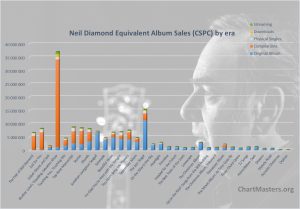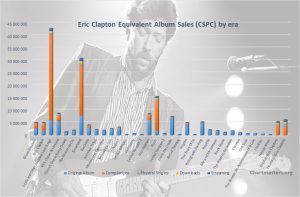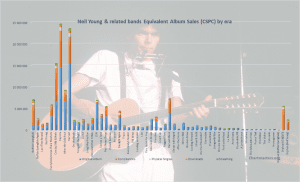David Bowie albums and songs sales
Exactly one year ago on January 10th, 2016, the music world lost one of the most talented and influential artist of all-time, David Bowie. The legendary singer of Heroes has been active from his young years until his very last days, dropping Blackstar, stylized ★, a mere two days before his passing.
From his very first single way back in 1964 to this last LP, the singer built an impressive catalog of 27 albums and countless of cult songs. His ever-changing style at times left out part of his public, at times attracted a complete new one. What remained consistent is the artist’s dedication to be as innovative as possible. While following trends is the easiest way to be successful, creating them isn’t always efficient in a commercial point of view. After over half a century of active career plus one year of tribute moments, the overall success of the artist is difficult to define. Anyone would be able to tell Elvis Presley or Michael Jackson have been huge and that Leonard Cohen or Roy Orbison surely haven’t sold that much, but David Bowie‘s status from a commercial viewpoint is unclear.
ChartMasters’ method: the CSPC
As usual, I’ll be using the Commensurate Sales to Popularity Concept (CSPC) in order to relevantly gauge the act’s results. It will not only bring you sales information for all albums, physical and download singles, as well as audio and video streaming. In fact, it will really determine the act’s popularity.
If you are not yet familiar with the CSPC method, below is a nice and short video of explaining the concept. I recommend watching it before reading on and to the sales figures. You’ll get the idea in just two minutes.
And if you want to know the full method as well as formulas, you can read the full introduction article.
Now let’s get into the artist’s detailed sales figures!
Original Albums Sales
David Bowie (1967)
- World – 200,000
Man of Words / Man of Music / Space Oddity (1969)

- America
- US – 775,000
- Canada – 100,000
- Argentina – N/A
- Brazil – N/A
- Mexico – N/A
- Asia
- Japan – 100,000
- Oceania
- Australia – 75,000
- New Zealand – 15,000
- Europe – 990,000
- UK – 450,000
- France – 90,000
- Germany – N/A
- Italy – 80,000
- Spain – 75,000
- Sweden – N/A
- Netherland – 30,000
- Switzerland – N/A
- Austria – N/A
- Finland – N/A
- World – 2,300,000
The Man Who Sold the World (1970)

- America
- US – 460,000
- Canada – 60,000
- Argentina – N/A
- Brazil – N/A
- Mexico – N/A
- Asia
- Japan – 100,000
- Oceania
- Australia – 75,000
- New Zealand – 15,000
- Europe – 980,000
- UK – 500,000
- France – 90,000
- Germany – N/A
- Italy – 55,000
- Spain – 50,000
- Sweden – N/A
- Netherland – 30,000
- Switzerland – N/A
- Austria – N/A
- Finland – N/A
- World – 1,900,000
Hunky Dory (1971)

- America
- US – 1,050,000
- Canada – 125,000
- Argentina – N/A
- Brazil – N/A
- Mexico – N/A
- Asia
- Japan – 200,000
- Oceania
- Australia – 150,000
- New Zealand – 30,000
- Europe – 2,660,000
- UK – 1,325,000
- France – 225,000
- Germany – N/A
- Italy – 180,000
- Spain – 125,000
- Sweden – N/A
- Netherland – 100,000
- Switzerland – N/A
- Austria – N/A
- Finland – N/A
- World – 4,700,000
The Rise and Fall of Ziggy Stardust and the Spiders from Mars (1972)
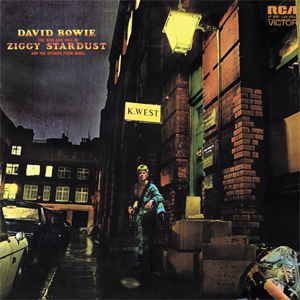
- America
- US – 2,900,000
- Canada – 350,000
- Argentina – N/A
- Brazil – N/A
- Mexico – N/A
- Asia
- Japan – 400,000
- Oceania
- Australia – 300,000
- New Zealand – 60,000
- Europe – 3,690,000
- UK – 1,575,000
- France – 350,000
- Germany – N/A
- Italy – 285,000
- Spain – 250,000
- Sweden – N/A
- Netherland – 150,000
- Switzerland – N/A
- Austria – N/A
- Finland – N/A
- World – 8,550,000
Aladdin Sane (1973)

- America
- US – 1,075,000
- Canada – 125,000
- Argentina – N/A
- Brazil – N/A
- Mexico – N/A
- Asia
- Japan – 200,000
- Oceania
- Australia – 200,000
- New Zealand – 40,000
- Europe – 2,740,000
- UK – 1,250,000
- France – 260,000
- Germany – N/A
- Italy – 155,000
- Spain – 150,000
- Sweden – N/A
- Netherland – 120,000
- Switzerland – N/A
- Austria – N/A
- Finland – N/A
- World – 4,900,000
PinUps (1973)

- America
- US – 600,000
- Canada – 80,000
- Argentina – N/A
- Brazil – N/A
- Mexico – N/A
- Asia
- Japan – 75,000
- Oceania
- Australia – 125,000
- New Zealand – 25,000
- Europe – 1,600,000
- UK – 800,000
- France – 125,000
- Germany – N/A
- Italy – 100,000
- Spain – 50,000
- Sweden – N/A
- Netherland – 80,000
- Switzerland – N/A
- Austria – N/A
- Finland – N/A
- World – 2,750,000
Diamond Dogs (1974)

- America
- US – 1,250,000
- Canada – 180,000
- Argentina – N/A
- Brazil – N/A
- Mexico – N/A
- Asia
- Japan – 100,000
- Oceania
- Australia – 130,000
- New Zealand – 25,000
- Europe – 1,710,000
- UK – 800,000
- France – 215,000
- Germany – 150,000
- Italy – 90,000
- Spain – 50,000
- Sweden – N/A
- Netherland – 50,000
- Switzerland – N/A
- Austria – N/A
- Finland – N/A
- World – 3,650,000
Young Americans (1975)

- America
- US – 1,300,000
- Canada – 125,000
- Argentina – N/A
- Brazil – N/A
- Mexico – N/A
- Asia
- Japan – 100,000
- Oceania
- Australia – 75,000
- New Zealand – 20,000
- Europe – 850,000
- UK – 375,000
- France – 105,000
- Germany – N/A
- Italy – 50,000
- Spain – N/A
- Sweden – N/A
- Netherland – 30,000
- Switzerland – N/A
- Austria – N/A
- Finland – N/A
- World – 2,650,000
Station to Station (1976)

- America
- US – 925,000
- Canada – 100,000
- Argentina – N/A
- Brazil – N/A
- Mexico – N/A
- Asia
- Japan – 120,000
- Oceania
- Australia – 80,000
- New Zealand – 15,000
- Europe – 1,130,000
- UK – 400,000
- France – 130,000
- Germany – N/A
- Italy – 75,000
- Spain – N/A
- Sweden – 75,000
- Netherland – 75,000
- Switzerland – N/A
- Austria – N/A
- Finland – N/A
- World – 2,600,000
Low (1977)
.jpg)
- America
- US – 675,000
- Canada – 75,000
- Argentina – N/A
- Brazil – N/A
- Mexico – N/A
- Asia
- Japan – 200,000
- Oceania
- Australia – 80,000
- New Zealand – 15,000
- Europe – 1,280,000
- UK – 550,000
- France – 100,000
- Germany – N/A
- Italy – 75,000
- Spain – N/A
- Sweden – 50,000
- Netherland – 100,000
- Switzerland – N/A
- Austria – 25,000
- Finland – N/A
- World – 2,600,000
Heroes (1977)

- America
- US – 675,000
- Canada – 75,000
- Argentina – N/A
- Brazil – N/A
- Mexico – N/A
- Asia
- Japan – 150,000
- Oceania
- Australia – 110,000
- New Zealand – 15,000
- Europe – 1,580,000
- UK – 475,000
- France – 155,000
- Germany – N/A
- Italy – 180,000
- Spain – N/A
- Sweden – 35,000
- Netherland – 140,000
- Switzerland – N/A
- Austria – 25,000
- Finland – N/A
- World – 2,900,000
Lodger (1979)

- America
- US – 280,000
- Canada – 40,000
- Argentina – N/A
- Brazil – N/A
- Mexico – N/A
- Asia
- Japan – 75,000
- Oceania
- Australia – 50,000
- New Zealand – 15,000
- Europe – 1,050,000
- UK – 315,000
- France – 175,000
- Germany – N/A
- Italy – 50,000
- Spain – N/A
- Sweden – 50,000
- Netherland – 55,000
- Switzerland – N/A
- Austria – 25,000
- Finland – N/A
- World – 1,650,000
Scary Monsters (And Super Creeps) (1980)
:format(jpeg):mode_rgb():quality(40)/discogs-images/R-1139488-1347450030-5142.jpeg.jpg)
- America
- US – 740,000
- Canada – 175,000
- Argentina – N/A
- Brazil – N/A
- Mexico – N/A
- Asia
- Japan – 120,000
- Oceania
- Australia – 220,000
- New Zealand – 40,000
- Europe – 1,930,000
- UK – 575,000
- France – 400,000
- Germany – 275,000
- Italy – 50,000
- Spain – 50,000
- Sweden – 100,000
- Netherland – 55,000
- Switzerland – N/A
- Austria – 25,000
- Finland – N/A
- World – 3,450,000
Let’s Dance (1983)

- America
- US – 2,725,000
- Canada – 675,000
- Argentina – N/A
- Brazil – N/A
- Mexico – N/A
- Asia
- Japan – 600,000
- Oceania
- Australia – 250,000
- New Zealand – 80,000
- Europe – 3,540,000
- UK – 950,000
- France – 650,000
- Germany – 475,000
- Italy – 200,000
- Spain – 180,000
- Sweden – 175,000
- Netherland – 120,000
- Switzerland – N/A
- Austria – 50,000
- Finland – 45,000
- World – 8,700,000
Tonight (1984)

- America
- US – 1,200,000
- Canada – 250,000
- Argentina – N/A
- Brazil – N/A
- Mexico – N/A
- Asia
- Japan – 300,000
- Oceania
- Australia – 80,000
- New Zealand – 15,000
- Europe – 1,150,000
- UK – 315,000
- France – 150,000
- Germany – 150,000
- Italy – 150,000
- Spain – 80,000
- Sweden – 30,000
- Netherland – 25,000
- Switzerland – 15,000
- Austria – 25,000
- Finland – N/A
- World – 3,400,000
Never Let Me Down (1987)
:format(jpeg):mode_rgb():quality(40)/discogs-images/R-1129693-1466179462-8591.jpeg.jpg)
- America
- US – 650,000
- Canada – 150,000
- Argentina – N/A
- Brazil – N/A
- Mexico – N/A
- Asia
- Japan – 100,000
- Oceania
- Australia – 50,000
- New Zealand – 10,000
- Europe – 1,120,000
- UK – 240,000
- France – 150,000
- Germany – 150,000
- Italy – 180,000
- Spain – 50,000
- Sweden – 60,000
- Netherland – 25,000
- Switzerland – 10,000
- Austria – 25,000
- Finland – N/A
- World – 2,300,000
Tin Machine (1989)

- America
- US – 400,000
- Canada – 75,000
- Argentina – N/A
- Brazil – N/A
- Mexico – N/A
- Asia
- Japan – 75,000
- Oceania
- Australia – 15,000
- New Zealand – 5,000
- Europe – 700,000
- UK – 125,000
- France – N/A
- Germany – 120,000
- Italy – 100,000
- Spain – N/A
- Sweden – 35,000
- Netherland – 25,000
- Switzerland – N/A
- Austria – 10,000
- Finland – N/A
- World – 1,400,000
Tin Machine II (1991)
- America
- US – 100,000
- Canada – 20,000
- Argentina – N/A
- Brazil – N/A
- Mexico – N/A
- Asia
- Japan – 60,000
- Oceania
- Australia – 5,000
- New Zealand – N/A
- Europe – 330,000
- UK – 25,000
- France – 50,000
- Germany – 60,000
- Italy – 50,000
- Spain – N/A
- Sweden – 20,000
- Netherland – 15,000
- Switzerland – N/A
- Austria – 5,000
- Finland – N/A
- World – 600,000
Black Tie White Noise (1993)

- America
- US – 200,000
- Canada – 60,000
- Argentina – N/A
- Brazil – N/A
- Mexico – N/A
- Asia
- Japan – 165,000
- Oceania
- Australia – 30,000
- New Zealand – 5,000
- Europe – 800,000
- UK – 200,000
- France – 100,000
- Germany – 125,000
- Italy – 125,000
- Spain – 40,000
- Sweden – 20,000
- Netherland – 15,000
- Switzerland – 10,000
- Austria – 10,000
- Finland – N/A
- World – 1,500,000
1. Outside (1995)

- America
- US – 250,000
- Canada – 50,000
- Argentina – N/A
- Brazil – N/A
- Mexico – N/A
- Asia
- Japan – 100,000
- Oceania
- Australia – 10,000
- New Zealand – 5,000
- Europe – 510,000
- UK – 100,000
- France – 125,000
- Germany – 65,000
- Italy – 50,000
- Spain – 15,000
- Sweden – 15,000
- Netherland – 20,000
- Switzerland – 5,000
- Austria – 10,000
- Finland – 5,000
- World – 1,050,000
Earthling (1997)
.jpg)
- America
- US – 300,000
- Canada – 50,000
- Argentina – N/A
- Brazil – N/A
- Mexico – N/A
- Asia
- Japan – 110,000
- Oceania
- Australia – 10,000
- New Zealand – 5,000
- Europe – 440,000
- UK – 90,000
- France – 75,000
- Germany – 60,000
- Italy – 65,000
- Spain – 15,000
- Sweden – 15,000
- Netherland – 15,000
- Switzerland – 5,000
- Austria – 10,000
- Finland – 5,000
- World – 1,050,000
Hours (1999)

- America
- US – 125,000
- Canada – 25,000
- Argentina – N/A
- Brazil – N/A
- Mexico – N/A
- Asia
- Japan – 80,000
- Oceania
- Australia – 10,000
- New Zealand – 5,000
- Europe – 620,000
- UK – 90,000
- France – 125,000
- Germany – 125,000
- Italy – 80,000
- Spain – 20,000
- Sweden – 15,000
- Netherland – 15,000
- Switzerland – 5,000
- Austria – 15,000
- Finland – 5,000
- World – 1,000,000
Heathen (2002)

- America
- US – 275,000
- Canada – 40,000
- Argentina – N/A
- Brazil – N/A
- Mexico – N/A
- Asia
- Japan – 45,000
- Oceania
- Australia – 20,000
- New Zealand – 5,000
- Europe – 780,000
- UK – 200,000
- France – 145,000
- Germany – 150,000
- Italy – 65,000
- Spain – 10,000
- Sweden – 25,000
- Netherland – 15,000
- Switzerland – 10,000
- Austria – 10,000
- Finland – 5,000
- World – 1,250,000
Reality (2003)

- America
- US – 175,000
- Canada – 30,000
- Argentina – N/A
- Brazil – 10,000
- Mexico – N/A
- Asia
- Japan – 35,000
- Oceania
- Australia – 20,000
- New Zealand – 8,000
- Europe – 590,000
- UK – 125,000
- France – 135,000
- Germany – 100,000
- Italy – 60,000
- Spain – 10,000
- Sweden – 15,000
- Netherland – 10,000
- Switzerland – 5,000
- Austria – 10,000
- Finland – 5,000
- World – 950,000
The Next Day (2013)

- America
- US – 235,000
- Canada – 50,000
- Argentina – N/A
- Brazil – 20,000
- Mexico – N/A
- Asia
- Japan – 65,000
- Oceania
- Australia – 35,000
- New Zealand – 10,000
- Europe – 980,000
- UK – 330,000
- France – 160,000
- Germany – 160,000
- Italy – 45,000
- Spain – 25,000
- Sweden – 25,000
- Netherland – 35,000
- Switzerland – 15,000
- Austria – 10,000
- Finland – 11,000
- World – 1,500,000
★ (Blackstar) (2016)

- America
- US – 500,000
- Canada – 85,000
- Argentina – N/A
- Brazil – 10,000
- Mexico – N/A
- Asia
- Japan – 75,000
- Oceania
- Australia – 75,000
- New Zealand – 15,000
- Europe – 1,110,000
- UK – 400,000
- France – 170,000
- Germany – 150,000
- Italy – 70,000
- Spain – 30,000
- Sweden – 30,000
- Netherland – 35,000
- Switzerland – 20,000
- Austria – 15,000
- Finland – 10,000
- World – 2,000,000
Original Album Sales – Comments
With such an extensive discography, the overall total of 71,5 million albums sold doesn’t look really big. Several factors need to be considered yet. One of them is the very low market during his hottest years in the first half of the 70s. Even his big Let’s Dance comeback happened in 1983 when the industry was facing very bad years.
A second key factor is the popularity distribution of the artist in a geographical sense. Absolutely massive in the UK during many years, David Bowie never truly broke the US main audience in spite of doing so in Canada. The fact he never topped the album chart in the US until he did so posthumously is a real evidence of that situation. He was also bigger in Belgium than in France, bigger in Austria than in Germany, bigger in New-Zealand than in Australia. In other words, he really missed a bigger impact on the largest markets. This may be explained by the highly developed style of his records which consequently performed better in cities than in rural areas, more relevant in the music market of very large countries.
A third factor of the relatively low number of studio albums sold is the release of numerous greatest hits type packages which limited catalog sales of the original LPs.
In any case, the number of albums released doesn’t necessarily translate in gigantic totals. During the last few years, we saw artists like Britney Spears or Alicia Keys among many others struggling an awful lot to sell half a million copies of an album, thus keeping numbers well above that mark during 49 years of new music despite no record ever breaking the 10 million milestone is a trademark of an appeal as enduring as solid.
Both Ziggy Stardust and Let’s Dance came close still at over 8,5 million each. It’s interesting to notice how the ground breaking classic Ziggy Stardust almost matched the way bigger album upon release Let’s Dance several decades after they first came out thanks to its catalog sales. It’s now only a matter of time until Ziggy Stardust takes an inevitable lead. Sales of the likes Hunky Dory may not impress at 4,7 million but when one considers it charted absolutely nowhere when issued in 1971 the figure suddenly ends up being pretty incredible.
1967 David Bowie – 200,000
1969 David Bowie – 2,300,000
1970 The Man Who Sold the World – 1,900,000
1971 Hunky Dory – 4,700,000
1972 The Rise and Fall of Ziggy Stardust and the Spiders from Mars – 8,550,000
1973 Aladdin Sane – 4,900,000
1973 Pin Ups – 2,750,000
1974 Diamond Dogs – 3,650,000
1975 Young Americans – 2,650,000
1976 Station to Station – 2,600,000
1977 Low – 2,600,000
1977 Heroes – 2,900,000
1979 Lodger – 1,650,000
1980 Scary Monsters (And Super Creeps) – 3,450,000
1983 Let’s Dance – 8,700,000
1984 Tonight – 3,400,000
1987 Never Let Me Down – 2,300,000
1989 Tin Machine – 1,400,000
1991 Tin Machine II – 600,000
1993 Black Tie White Noise – 1,500,000
1995 1. Outside – 1,050,000
1997 Earthling – 1,050,000
1999 Hours – 1,000,000
2002 Heathen – 1,250,000
2003 Reality – 950,000
2013 The Next Day – 1,500,000
2016 ★ (Blackstar) – 2,000,000
Physical Singles Sales
As a reminder, the weighting is done with a 10 to 3 ratio between one album and one physical single.
1967-73
Cult songs doesn’t mean huge selling physical single. Heroes has featured the Top 100 best songs ever rankings of all relevant music magazines at the turn of the millennium. Still, when first released the single only made it to #24 in the UK while completely missing the Top 100 in the US.
The road displayed below has been difficult for David Bowie with various stand-alone singles issued from 1964 to 1968, all of them failing to chart, even in the UK. Then his 10th single came out in 1969, Space Oddity, at last starting his career as a popular singer. Incredibly enough, the artist remained a one-hit wonder until Starman shot him to fame in the summer of 1972.
Various of his pre-1973 hits have been reissue countless of times, some of them very successfully. This is how in the UK 1969 single Space Oddity peaked at #1 in 1975 after originally making it to #5. 1967 song Laughing Gnome went #6 in 1973. Rock & Roll Suicide from the already successful Ziggy Stardust album made it to #22 in 1974 after 3 subsequent David Bowie albums got released. The list goes on and on. Thus, without really crushing the Singles chart, the artist total physical singles for his material up to Aladdin Sane album stands at more than 7 million units sold.
David Bowie (1967) – 135,000 equivalent albums
The Laughing Gnome – 350,000
Remaining Singles – 100,000
David Bowie (1969) – 675,000 equivalent albums
Space Oddity – 2,200,000
Remaining Singles – 50,000
The Man Who Sold the World (1970) – 15,000 equivalent albums
All Singles – 50,000
Hunky Dory (1971) – 435,000 equivalent albums
Changes – 600,000
Life On Mars? – 850,000
The Rise and Fall of Ziggy Stardust and the Spiders from Mars (1972) – 405,000 equivalent albums
John, I’m Only Dancing – 300,000
Starman – 650,000
Rock ‘N’ Roll Suicide – 200,000
Remaining Singles – 200,000
Aladdin Sane (1973) – 472,500 equivalent albums
Drive-In Saturday – 350,000
Let’s Spend The Night Together – 175,000
The Jean Genie – 950,000
Remaining Singles – 100,000
1973-79
Little by little, David Bowie continued to amass various good hits, some other moderate ones. Fame, from 1975, was the artist true breakthrough song in the US by climbing all the way to #1 while he never made the top 10 before that one. Ironically, it peaked at a low #17 in the UK. Young Americans singles have noteworthy sales very precisely because young Americans cherished them.
Dropping consistently one album per year the British star moved more than 10 million units of singles from 1973 to 1979.
Pin Ups (1973) – 330,000 equivalent albums
Sorrow – 1,100,000
Diamond Dogs (1974) – 420,000 equivalent albums
Diamond Dogs – 400,000
Rebel Rebel – 900,000
Remaining Singles – 100,000
Young Americans (1975) – 945,000 equivalent albums
Young Americans – 700,000
Fame – 2,050,000
John, I’m Only Dancing (Again) – 400,000
Station to Station (1976) – 615,000 equivalent albums
Golden Years – 1,500,000
TVC 15 – 250,000
Wild Is The Wind – 250,000
Remaining Singles – 50,000
Low (1977) – 390,000 equivalent albums
Sound And Vision – 1,200,000
Remaining Singles – 100,000
Heroes (1977) – 135,000 equivalent albums
Beauty And The Beast – 100,000
Heroes – 350,000
Lodger (1979) – 225,000 equivalent albums
D.J. – 250,000
Boys Keep Swinging – 450,000
Remaining Singles – 50,000
1980-87
While retaining a solid position in the UK, topping charts in 1980 and in 1981 with singles Ashes to Ashes and Under Pressure, by 1982 it had been seven years since David Bowie last visited the US top 10 of the Hot 100.
In 1983 the album Let’s Dance fixed the situation. For the very first time of his career, the artist got one trans-Atlantic Top 5 single. A global #1, the title song of that album is one of the very best selling singles of the 80s at 5,5 million units sold. That massive hit also boosted following singles from the album which added 4,7 million sales. In terms of physical singles sales, this remains by very far the artist biggest era of his career. It also represents a large chunk of the 16 million singles he sold as a solo artist during the 80s since both follow up eras failed to replicate a similar success.
Scary Monsters (And Super Creeps) (1980) – 915,000 equivalent albums
Up The Hill Backwards – 150,000
Scary Monsters (And Super Creeps) – 150,000
Ashes To Ashes – 1,900,000
Fashion – 850,000
Let’s Dance (1983) – 3,060,000 equivalent albums
Let’s Dance – 5,500,000
China Girl – 2,300,000
Modern Love – 1,800,000
Without You – 200,000
Cat People (Putting Out Fire) – 400,000
Tonight (1984) – 600,000 equivalent albums
Loving The Alien – 300,000
Tonight – 500,000
Blue Jean – 1,200,000
Never Let Me Down (1987) – 315,000 equivalent albums
Day-In Day-Out – 550,000
Time Will Crawl – 100,000
Never Let Me Down – 400,000
1989-2003
Since his Tin Machine years, David Bowie never got relevant physical singles sales again. Already past his 40s by that time, the age of his target audience as well as the ever-decreasing market inevitably pushed figures from this format to go down and down era after era. As a result, his last 10 albums combined aren’t enough to add for 2 million physical singles sales of all their releases combined.
Tin Machine (1989) – 60,000 equivalent albums
Under the God – 100,000
Remaining Singles – 100,000
Tin Machine II (1991) – 45,000 equivalent albums
You Belong in Rock n’ Roll -100,000
Remaining Singles – 50,000
Black Tie White Noise (1993) – 105,000 equivalent albums
Black Tie White Noise – 50,000
Jump They Say – 200,000
Miracle Goodnight – 50,000
Real Cool World – 50,000
1. Outside (1995) – 127,500 equivalent albums
The Hearts Filthy Lesson – 175,000
Hallo Spaceboy – 200,000
Strangers When We Meet – 50,000
Earthling (1997) – 105,000 equivalent albums
Little Wonder – 75,000
Seven Years In Tibet – 25,000
Dead Man Walking – 50,000
Telling Lies – 25,000
I’m Afraid Of Americans – 175,000
Hours (1999) – 45,000 equivalent albums
Thursday’s Child – 100,000
Remaining Singles – 50,000
Heathen (2002) – 30,000 equivalent albums
Everyone Says ‘Hi’ – 50,000
Remaining Singles – 50,000
Reality (2003) – 15,000 equivalent albums
All Singles – 50,000
Orphan songs
Along with the busy release schedule of his albums and related singles, David Bowie also published various notable duets and soundtrack songs.
This includes Queen duet Under Pressure, Mick Jagger duet Dancing in the Street as well as Bing Crosby partnership Peace on Earth / Little Drummer Boy. Those 3 singles combined add for 5 million units sold.
Never considered as a real hit maker, by securing that average hits routine during several decades David Bowie concludes on a huge 43 million physical singles sales.
Orphan – 2,640,000 equivalent albums
Knock on Wood – 150,000
Alabama Song – 150,000
Under Pressure – 1,900,000
Peace on Earth/Little Drummer Boy – 700,000
Without You I’m Nothing – 200,000
White Light/White Heat -100,000
This Is Not America – 1,200,000
Dancing in the Street – 2,400,000
Absolute Beginners – 1,100,000
Underground – 300,000
When the Wind Blows – 75,000
The Buddha of Suburbia – 75,000
Arnold Layne – 50,000
Remaining Singles – 400,000
Digital Singles Sales
As a reminder, the weighting is done with a 10 to 1,5 ratio between one album and one digital single.
1967-73
Maybe surprisingly, just like in the physical format Space Oddity ends up quite easily as David Bowie best selling hit in download format, currently closing in the 2 million mark.
It had really no challenger as no song from the cult trio Hunky Dory – Ziggy Stardust – Aladdin Sane broke even the 1 million mark. Often combined together as the stand-out moment of the artist career, Aladdin Sane hits truly fails to attract as many buyers as songs from the other two albums.
The overall tally of 7 million downloads from all songs of following six albums appears to be someway disappointing considering how many well-known songs are featured.
David Bowie (1967) – 15,000 equivalent albums
Remaining Tracks – 100,000
David Bowie (1969) – 308,000 equivalent albums
Space Oddity – 1,900,000
Remaining Tracks – 150,000
The Man Who Sold the World (1970) – 60,000 equivalent albums
The Man Who Sold The World – 300,000
Remaining Tracks – 100,000
Hunky Dory (1971) – 330,000 equivalent albums
Changes – 850,000
Life On Mars? – 850,000
Remaining Tracks – 500,000
The Rise and Fall of Ziggy Stardust and the Spiders from Mars (1972) – 308,000 equivalent albums
Moonage Daydream – 400,000
Starman – 700,000
Ziggy Stardust – 400,000
Suffragette City – 150,000
Rock ‘N’ Roll Suicide – 100,000
Remaining Tracks – 300,000
Aladdin Sane (1973) – 68,000 equivalent albums
The Jean Genie – 200,000
Remaining Tracks – 250,000
1973-79
From the rest of the 70s, Heroes happens to be just over 1 million units sold, the pop star only million seller of the decade. While songs from all albums up to Heroes retain some relevance moving more than 4 million units together, the track list of Lodger seems to be completely forgotten for years.
Pin Ups (1973) – 23,000 equivalent albums
Sorrow – 75,000
Remaining Tracks – 75,000
Diamond Dogs (1974) – 120,000 equivalent albums
Rebel Rebel – 600,000
Remaining Tracks – 200,000
Young Americans (1975) – 195,000 equivalent albums
Young Americans – 500,000
Fame – 650,000
Remaining Tracks – 150,000
Station to Station (1976) – 60,000 equivalent albums
Golden Years – 200,000
Remaining Tracks – 200,000
Low (1977) – 60,000 equivalent albums
Sound And Vision – 200,000
Remaining Tracks – 200,000
Heroes (1977) – 165,000 equivalent albums
Heroes – 1,000,000
Remaining Tracks – 100,000
Lodger (1979) – 15,000 equivalent albums
Remaining Tracks – 100,000
1980-87
As it had to be expected, songs from Let’s Dance perform much better than anything else from the artist 80s catalog. This is still nothing sensational as the scale of 1 million-ish for his very top sellers and around half a million for his other classic gems remains true, a scale fairly low in comparison to other artists.
At 2,5 million, the total of all songs from below four albums is indeed disappointing with the one of Never Let Me Down being really very, very down from his standards.
Scary Monsters (And Super Creeps) (1980) – 75,000 equivalent albums
Ashes To Ashes – 300,000
Fashion – 100,000
Remaining Tracks – 100,000
Let’s Dance (1983) – 270,000 equivalent albums
Modern Love – 350,000
China Girl – 300,000
Let’s Dance – 950,000
Cat People (Putting Out Fire) – 150,000
Remaining Tracks – 50,000
Tonight (1984) – 23,000 equivalent albums
Blue Jean – 75,000
Remaining Tracks – 75,000
Never Let Me Down (1987) – 5,000 equivalent albums
Remaining Tracks – 30,000
1989-99
During the 90s the cult status of David Bowie got more and more confirmed with his past songs being often used in TV shows and ads plus his influence visibility increasing year after year. His new material was still failing to impress though. No song from below batch sold more than 100,000 units in download format.
Tin Machine (1989) – 3,000 equivalent albums
Remaining Tracks – 20,000
Tin Machine II (1991) – 0 equivalent albums
Remaining Tracks – 0
Black Tie White Noise (1993) – 8,000 equivalent albums
Remaining Tracks – 50,000
1. Outside (1995) – 15,000 equivalent albums
Remaining Tracks – 100,000
Earthling (1997) – 23,000 equivalent albums
I’m Afraid Of Americans – 75,000
Remaining Tracks – 75,000
Hours (1999) – 15,000 equivalent albums
Remaining Tracks – 100,000
2002-16
In recent years, the trend of lackluster performance from the singer singles continued. Even arguably nice successes like The Next Day and Blackstar that got released during the digital age saw their singles selling very poorly in download format.
Heathen (2002) – 23,000 equivalent albums
Remaining Tracks – 150,000
Reality (2003) – 23,000 equivalent albums
Remaining Tracks – 150,000
The Next Day (2013) – 45,000 equivalent albums
Where Are We Now? – 150,000
Remaining Tracks – 150,000
★ (Blackstar) (2016) – 60,000 equivalent albums
★ (Blackstar) – 100,000
Lazarus – 150,000
Remaining Tracks – 150,000
Orphan songs
Here comes the last set of download sales for songs that aren’t part of original studio albums. Better late than never, we do get one real strong seller with Under Pressure at 3,4 million. No doubt the outstanding appeal of Queen songs from this format largely helped for that matter. In fact, Under Pressure is only one among many 3+ million sellers for the band while it is the only song at such level for David Bowie.
Orphan – 660,000 equivalent albums
Under Pressure – 3,400,000
Dancing in the Street – 200,000
Absolute Beginners – 200,000
This Is Not America – 100,000
Peace on Earth/Little Drummer Boy – 200,000
Remaining Tracks – 300,000
Streaming Sales
The table below lists Spotify streaming of all songs from the five albums we are studying. The Comprehensive Streaming is reached by multiplying Spotify figures by 68/26. In fact, as shown in IFPI 2015 Report, there were 68 million paying subscribers to all streaming platforms by the end of 2015. While the exact count of Spotify paying subscribers by the end of 2015 is unknown, that figure reached 20 million in June 2015 and 30 million in March 2016, thus an estimated 26 million is used as of the end of 2015.
The equivalent album sales is the division of the comprehensive streaming figure by 1500 as it is now the norm in the new industry model.
NB: as we now switched to 2017, Chartmasters.org is going to update the ratio used on this methodology as soon as official market information from IFPI gets published in order to maintain the relevancy of all figures.
Streaming Part 1 – Breaking Over
The consistency of most of those three early albums tracks is very respectable, almost all of them topping 100,000 plays and almost all as well being over 500,000 from 1969 album. Nevertheless, only two songs top 2,5 million, although they do it in great fashion.
The first is Nirvana-covered hit The Man Who Sold The Wold at 17 million while the breakthrough smash Space Oddity is up to an impressive 61 million, easily enough to make it one of the Top 100 most streamed song from the 60s. This brings a nice 124,000 album sales equivalent to its parent album.
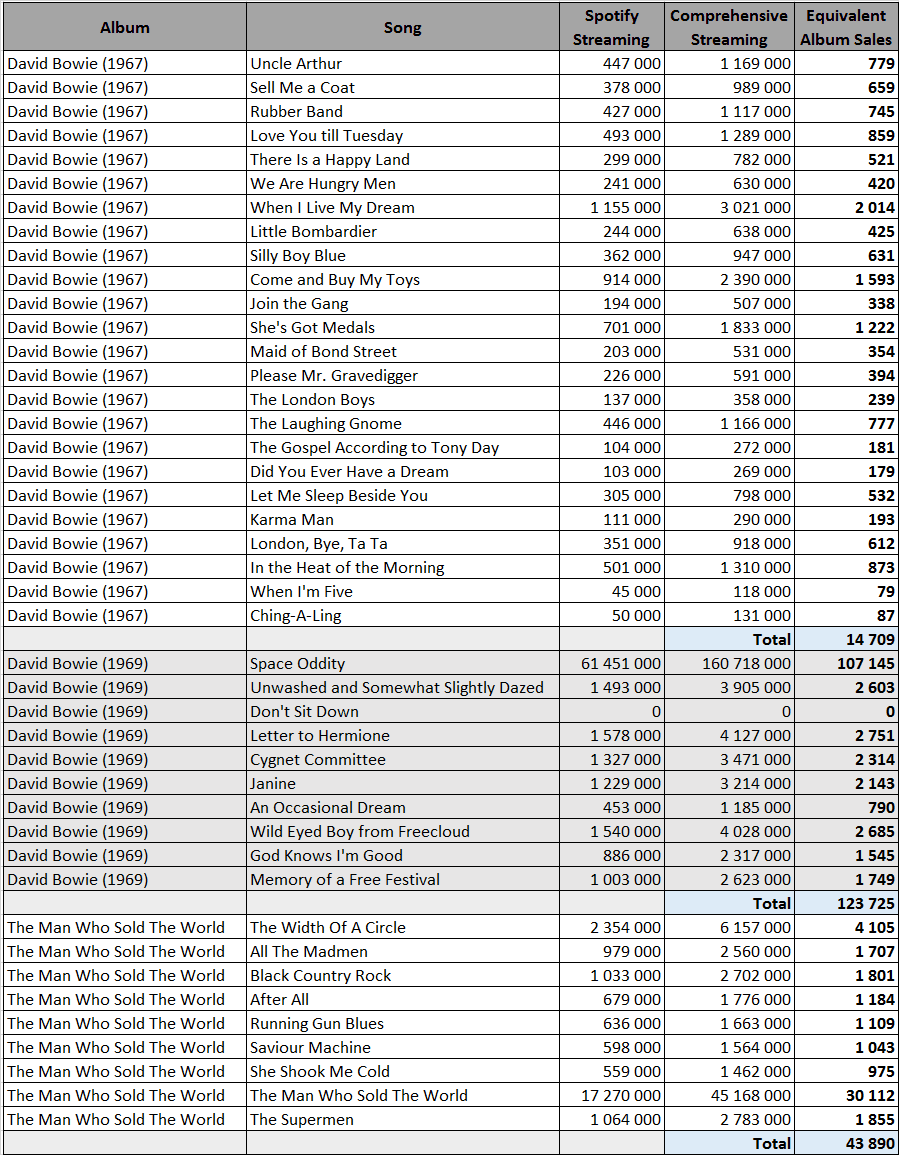
Streaming Part 2 – The Golden Years
It is no news that each of those three albums are classic ones. One thing is absolutely unique there still. If one checks the tracklist of David Bowie early live albums – David Live / Stage / Ziggy Stardust the Motion Picture – or his first major best of Changesonebowie from 1976, they all left out both Life On Mars? and Starman. We are speaking about the two most remembered hits from those years. It is truly unique that near-unknown songs from that time ended up as absolute must-haves decades later, ultimately topping all legitimate hits from the 70s.
Streaming results are obviously much higher than those of previous albums. Hunky Dory two singles add for 94 million plays and two album tracks Oh! You Pretty Things and Queen Bitch have notable streams for non-singles too, although the former was a #11 song for Peter Noone in 1971. All its tracks are breaking the doors of the 2 million plays barrier.
Ziggy Stardust album is even stronger overall. Starman, Ziggy Stardust and Moonage Daydream are all on 30 million and more while everything else is on at least 3,3 million. In terms of equivalent album sales, those two albums total near half a million units.
Surprisingly, Aladdin Sane is much weaker. We can highlight its cult status by the fact all songs are at least on 1,7 million but its hits are truly lacking strength as even the stand-out track The Jean Genie is still under 10 million.
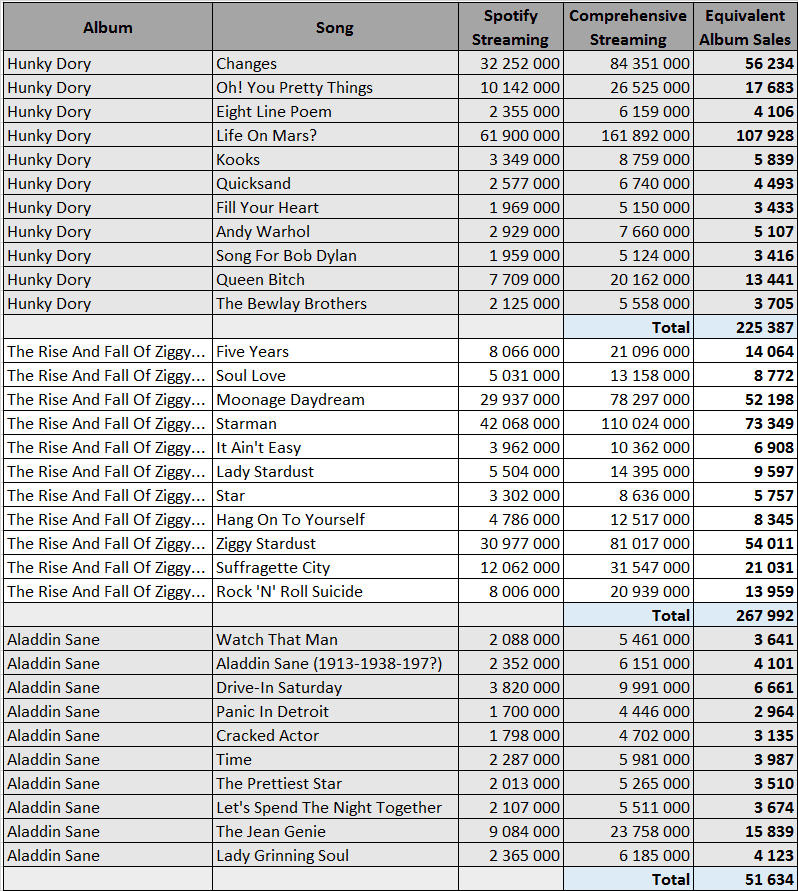
Streaming Part 3 – Rebel Fame
Slowing down with Pin Ups album, David Bowie instantly rebounded thanks to the successful Diamond Dogs record. It wasn’t all about the cult cover but also notable hits including the big Rebel Rebel at 38 million streams. With 91,000 equivalent album sales, the album outperforms its immediate predecessor by 6 to 1.
Following two albums include a total of three moderate streaming hits, Young Americans, Fame and Golden Years.
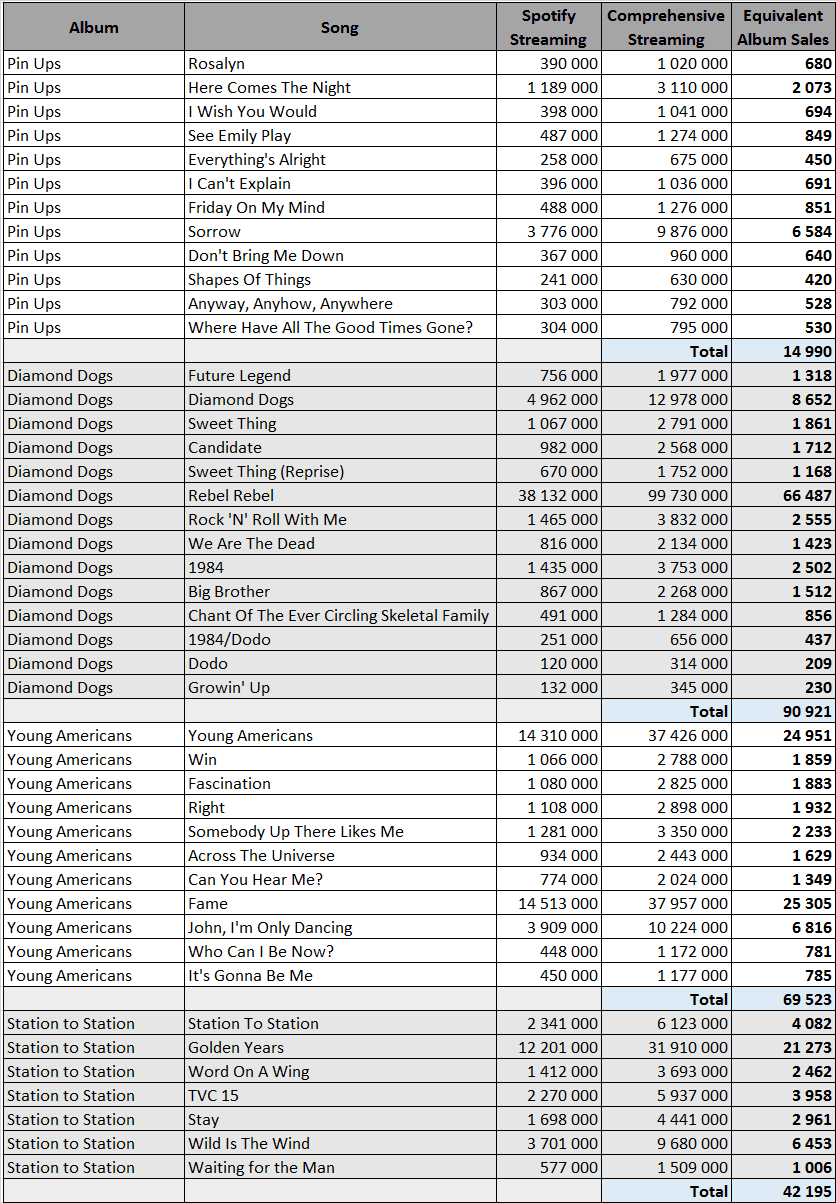
Streaming Part 4 – Hero Alone
Both Low and Heroes maintain a status similar to previous albums. Overall, most songs are over 1 million. The main difference is clearly Heroes title track which is up to an impressive 77 million plays.
In comparison, Lodger album truly pales as it only contains two songs with more than 1 million streams resulting in only 13,000 equivalent album sales.
Once again, the singer immediately recovered thanks to Ashes to Ashes hit which pushes Scary Monsters to 54,000 equivalent album sales.
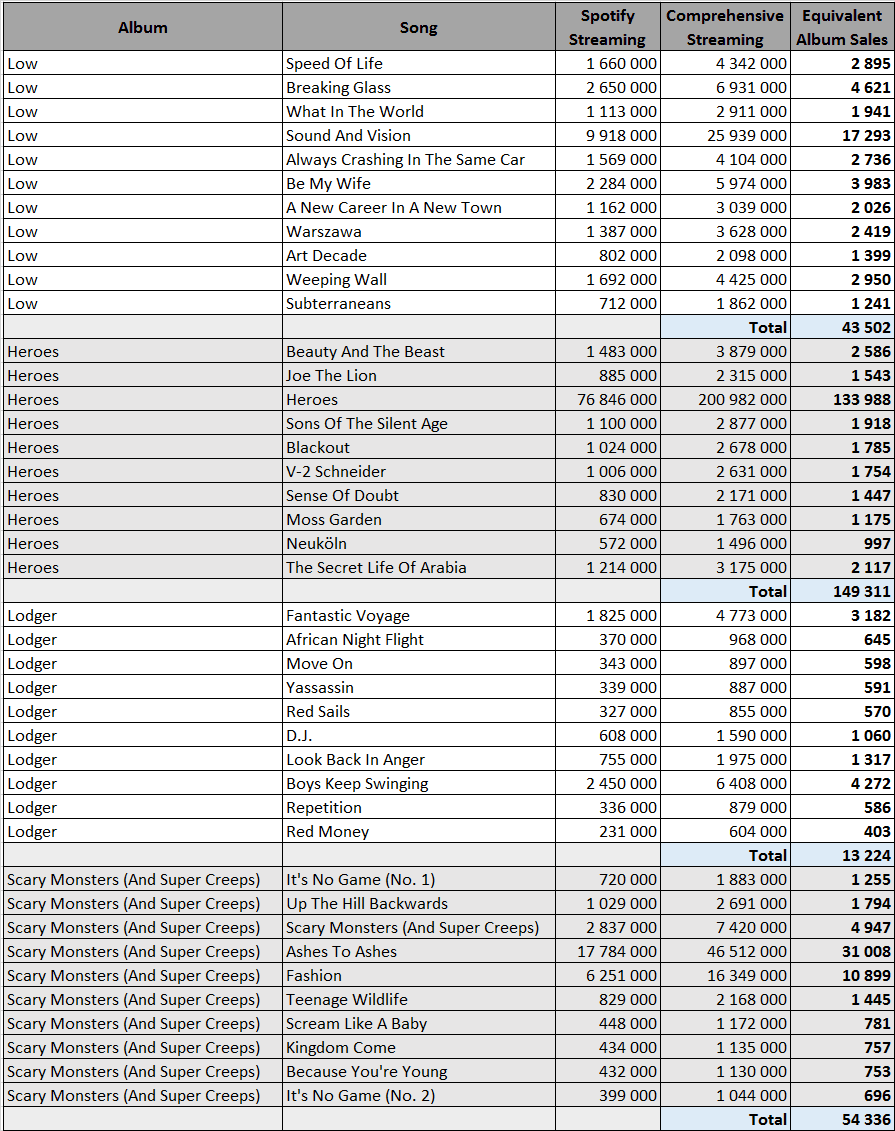
Streaming Part 5 – Let’s Dance… Just a bit
Album tracks from Let’s Dance aren’t as strong as those from his early 70s classics. With half of the songs being sizable hits though this has very little impact. Let’s Dance remains a very strong track with 66 million streams while three more songs total 53 million. Combined, this equals to 217,000 album sales.
Clearly, next two albums are massive disappointments in comparison. No song from Never Let Me Down comes even close to 1 million plays.
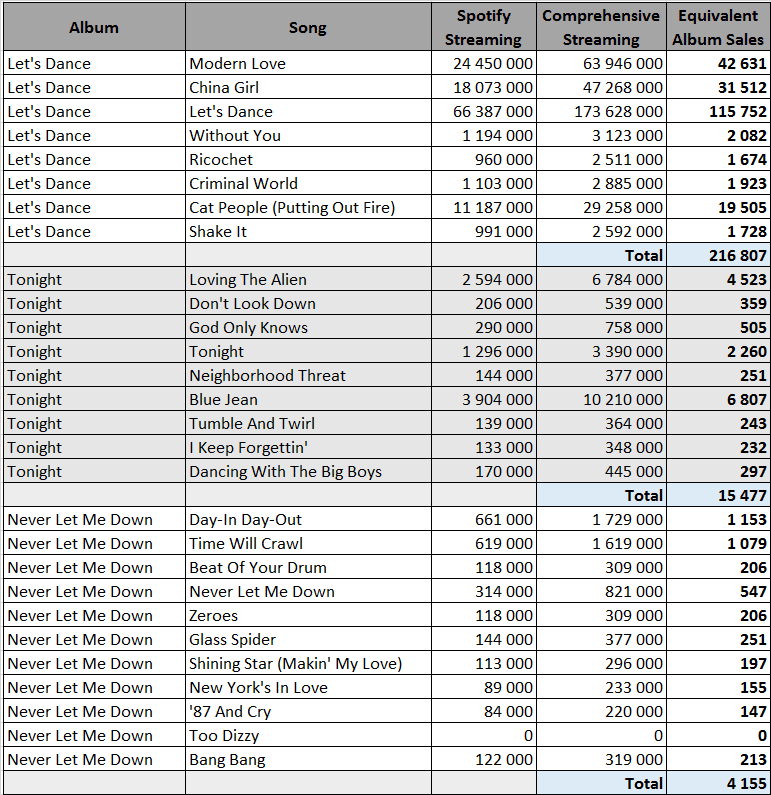
Streaming Part 6 – Broken Machine
Well, from that point David Bowie songs are truly less memorable which is obvious on those listings. Not much more to comment as figures are abysmal.
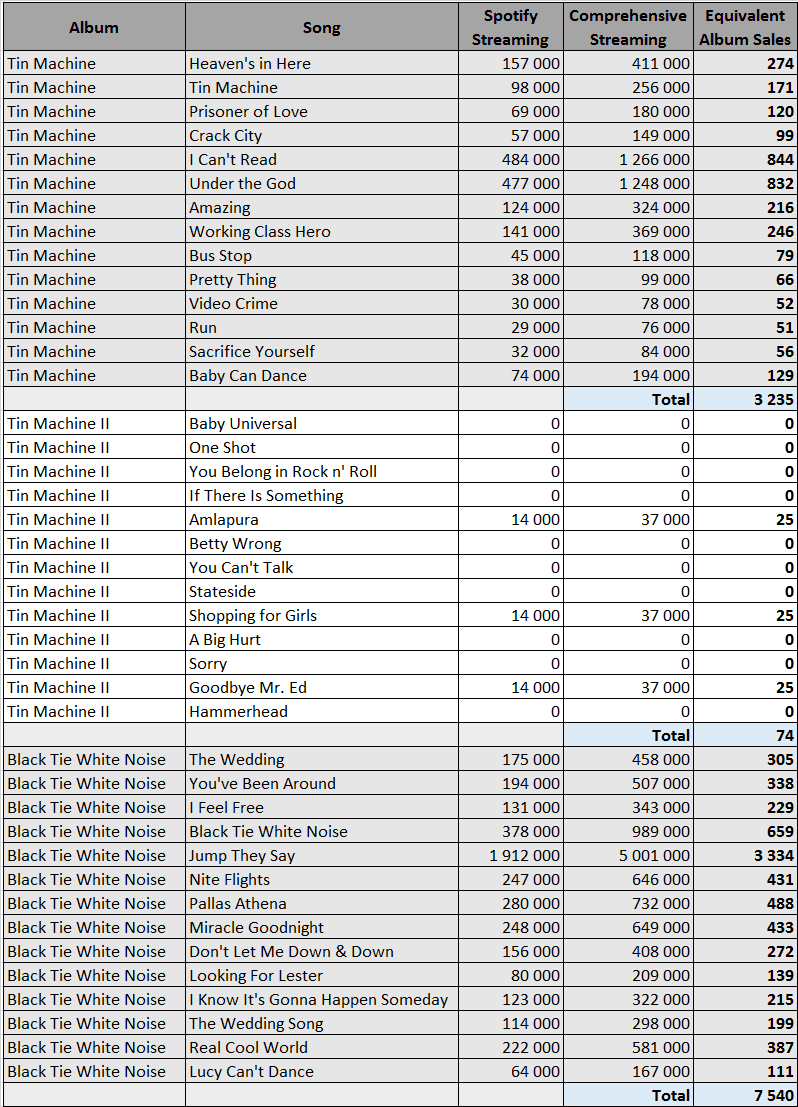
Streaming Part 7 – Slightly Improving
From mid-90s when there wasn’t much expectations anymore from his albums David Bowie someway managed to improve a bit from previous albums. Those four albums all include multiple songs over 1 million streams, something last seen in 1984 album Tonight. If 15,000 to 20,000 equivalent album sales a piece isn’t big, that is surely respectable for records with no well-known songs.
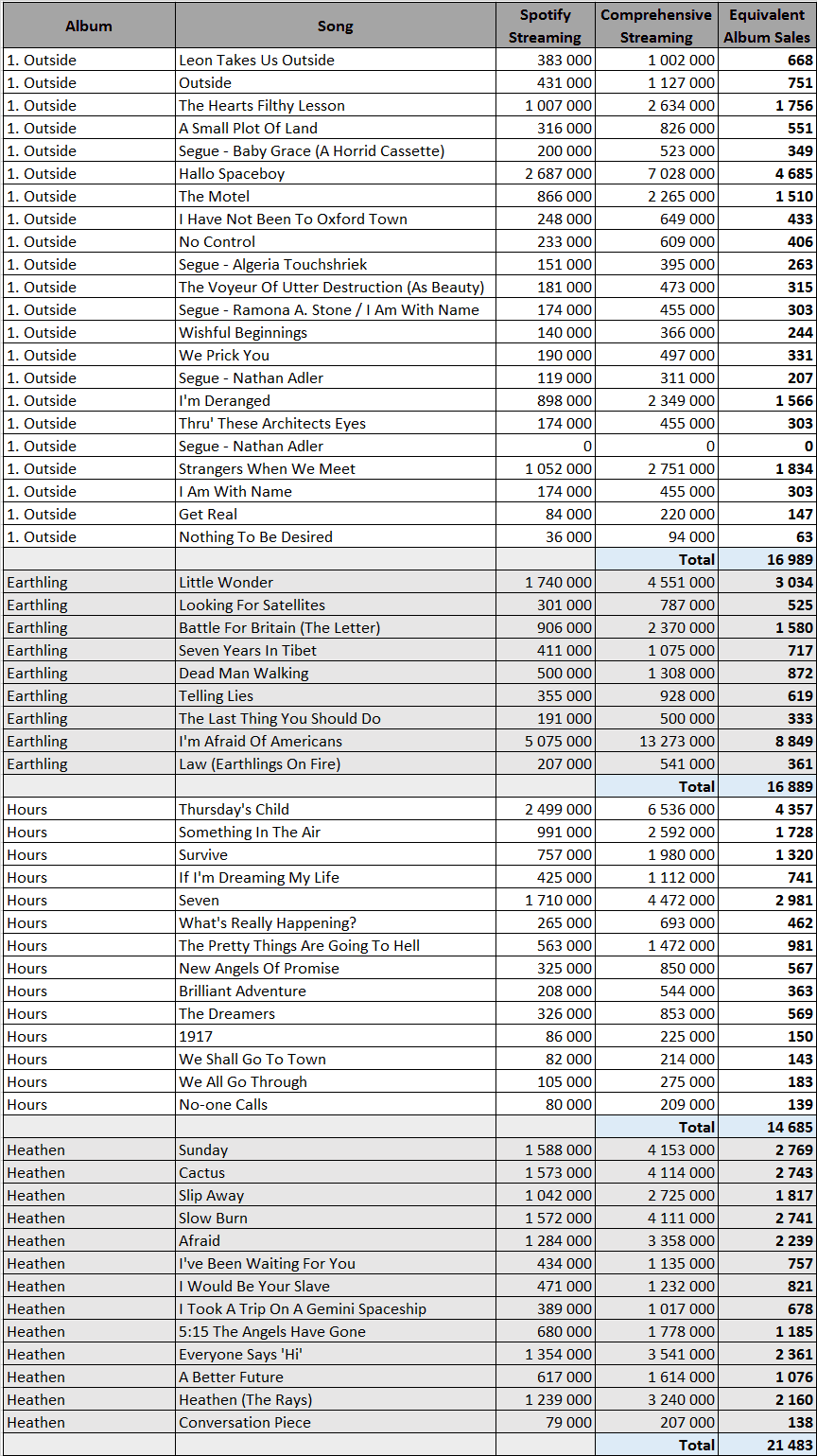
Streaming Part 8 – Picking Up
It is hard to tell how much of the Reality to The Next Day increase is due to real improvement or due to the development of the streaming market. That market climbed so much from 2013 to 2016 though, plus the boost of his passing, the improvement seems real as most of those plays happened when The Next Day itself was a catalog record.
Logically, Blackstar pursued the increase even if we may have expected more.
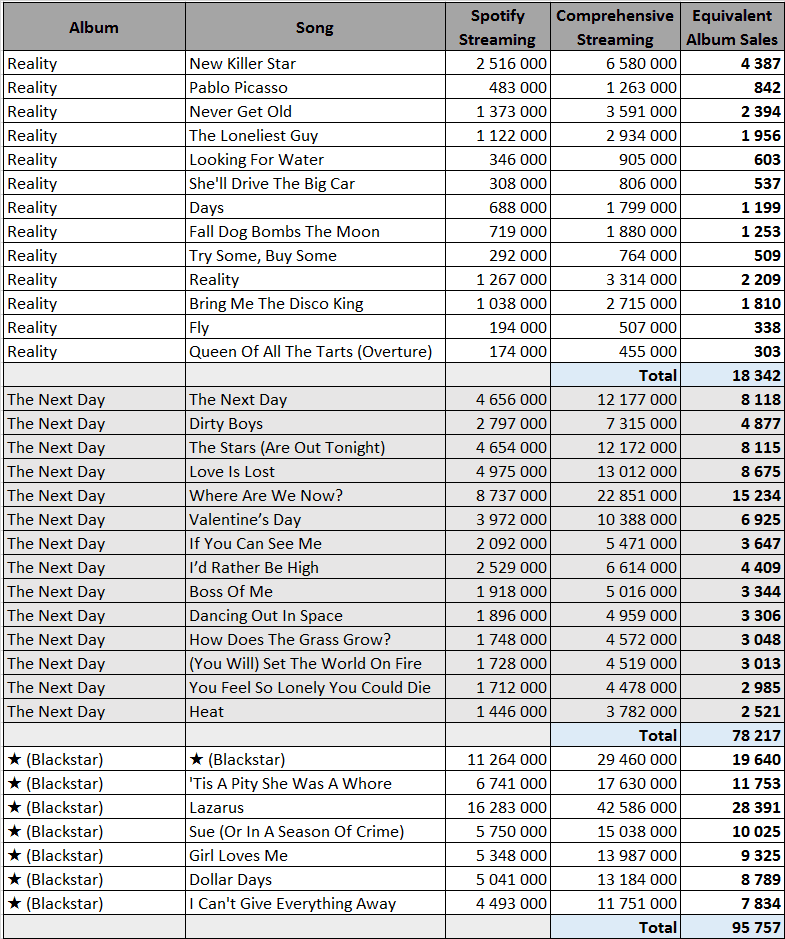
Streaming Part 9 – Orphan Album
As seen on previous categories the biggest tracks from this list are arguably Under Pressure and Dancing in the Street. While the latter was the best seller in physical form, the former absolutely crushes it in the streaming field with a 126 to 7 million lead. It is quite simply the biggest digital hit of David Bowie and one of the 20 biggest hits from the entire 80s.

Full Length related records Sales
With such an extensive career and so many labels involved as in David Bowie case, we haven’t miss releases of live or compilations albums, plus music videos. He is also responsible for several minor soundtracks, all of which are listed within’ the upcoming pages.
Remaining Long Format Part 1 – Live Albums
How to understand this table? If you check for example David Live live album line, those figures mean it sold 1,900,000 units worldwide. The second statistics column means all versions of all songs included on this package add for 219 million streaming plays on Spotify as of January 6th 2017.
The second part at the right of the table shows how many streams are coming from each original album plus the share it represents on the overall package streams. Thus, streaming figures tell us Hunky Dory songs are responsible for 15% of the David Live tracklist attractiveness, which means it generated 1,045,000 of its 280,000 album sales and so on for the other records.
This first batch of albums includes all his official live albums. As previously mentioned, some of the biggest songs from Ziggy Stardust and Hunky Dory have been ignored by many of them, they still claim a good share of those packages attractiveness. The absence of really identified greatest hits list, all those live albums include some very diverse songs which is why we can’t isolate a specific pattern in terms of sales distribution among studio albums. At nearly 4,5 million units sold, they bring some relevant sales to most albums up to 1977 set Heroes.
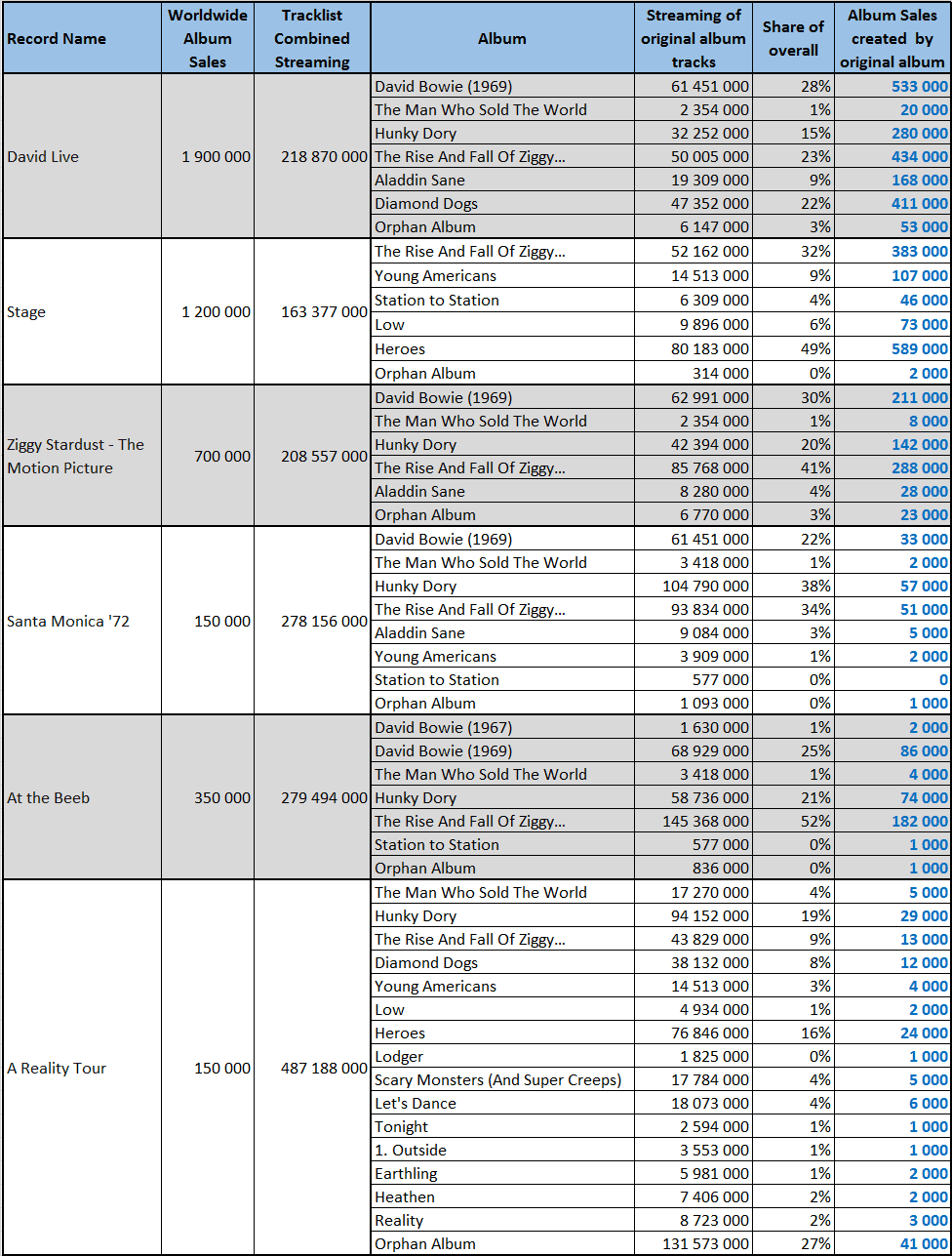
Remaining Long Format Part 2 – Early Compilations
Just like with previous page live albums, labels were still searching for the most relevant compilation of tracks with those early packages. While Images, Chameleon, Rare and Golden Years are aimed to be specific releases, the others were supposed to be career spanning compilations up to that point, but still have deeply different songs. Changesonebowie leaves out Starman and Life On Mars? while none of both Changes sets include Heroes.
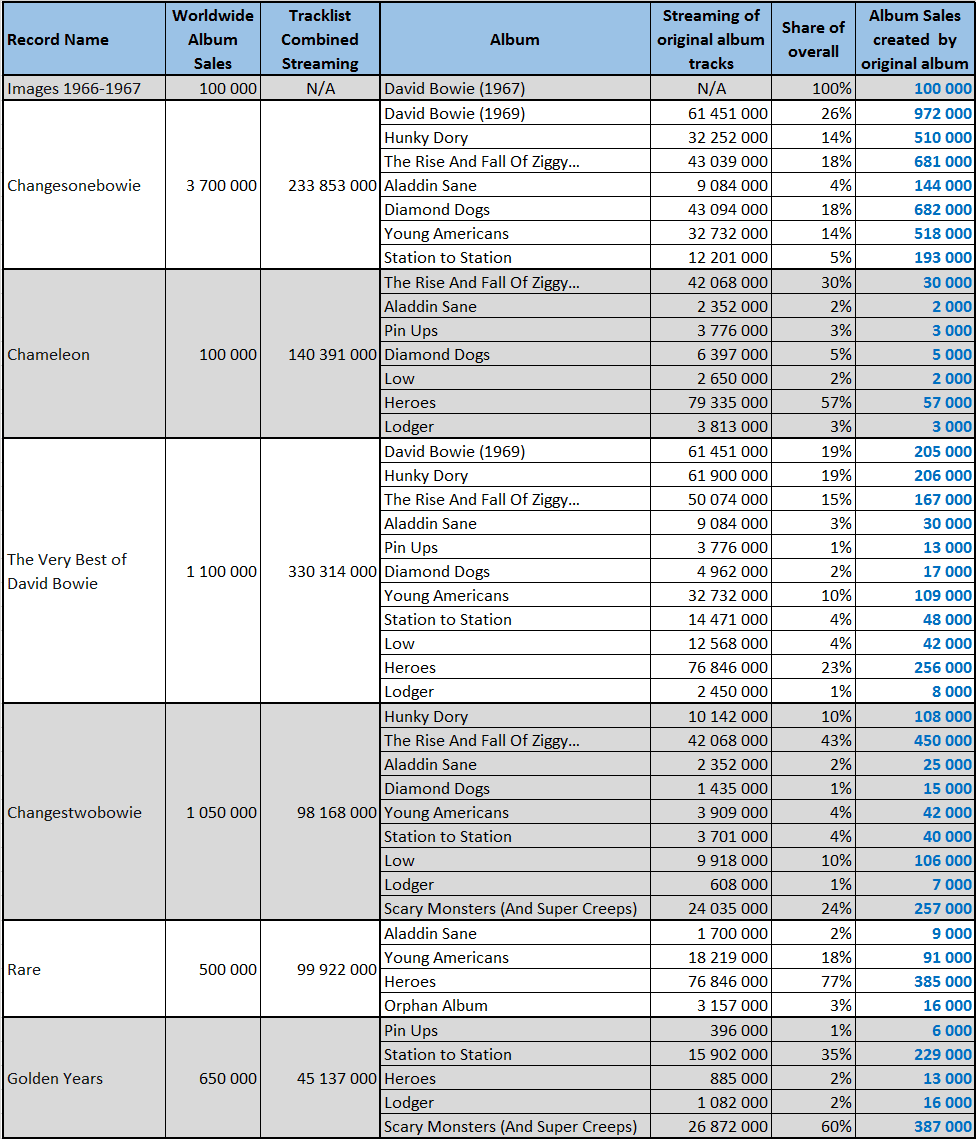
Remaining Long Format Part 3 – Compilations #2
As incredible as it seems, by 1989 album Sound + Vision cult hits like Starman and Life On Mars? were still purely ignored in spite of the package containing 42 songs!
At last with Changesbowie, the winning formula was found. The Singles Collection improved the content even more by adding on top of all David Bowie best remembered songs the duet Under Pressure, which powers the Orphan Album to the largest share among all sales generators.
With those two good selling career spanning compilations, we can identify the real pattern of the artist discography. 1969 David Bowie, Hunky Dory, Ziggy Stardust, Heroes and Let’s Dance all represent from 8 to 15% of the catalog strenght. This absence of truly dominant record distributes sales through all albums quite equally. The likes Diamond Dogs, Young Americans, Station To Station and Scary Monsters also claim some decent parts of various compilations.
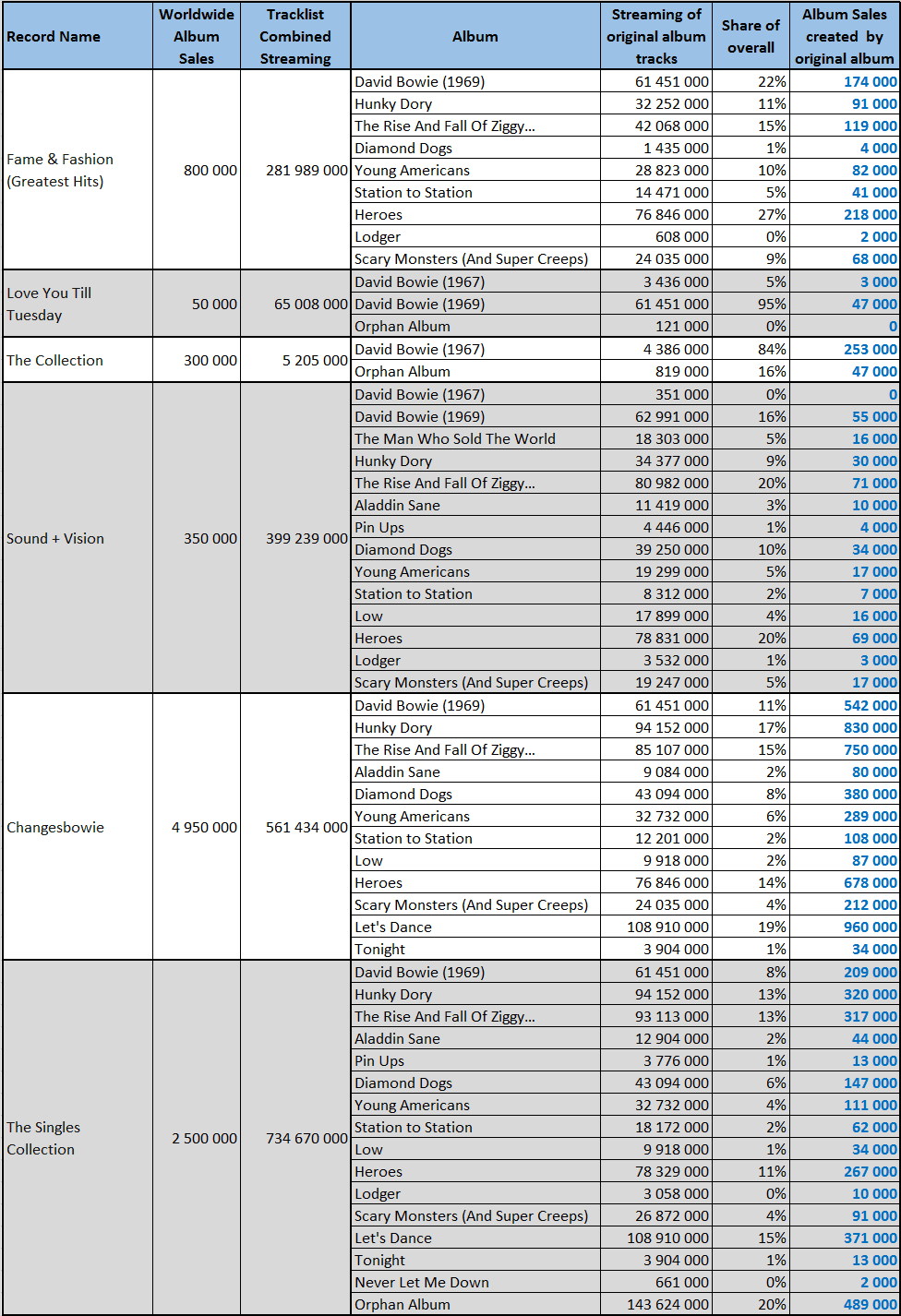
Remaining Long Format Part 4 – Platinum Collection Box
Both 69/74 and 74/79 best of albums got released in 1997 and 1998, with the tripled Platinum Collection set coming out in 2005. The newly added third disc 80/87 got his own release a couple of years later.
As the box contains the exact same 3 albums released individually, its sales got distributed in full to each of them, which is why sales assigned to studio albums amount to 1,8 million while the original box sold 600,000 units. Logically, now that the definitive artist best hits got defined, that distribution follows the same pattern of previously seen packages.
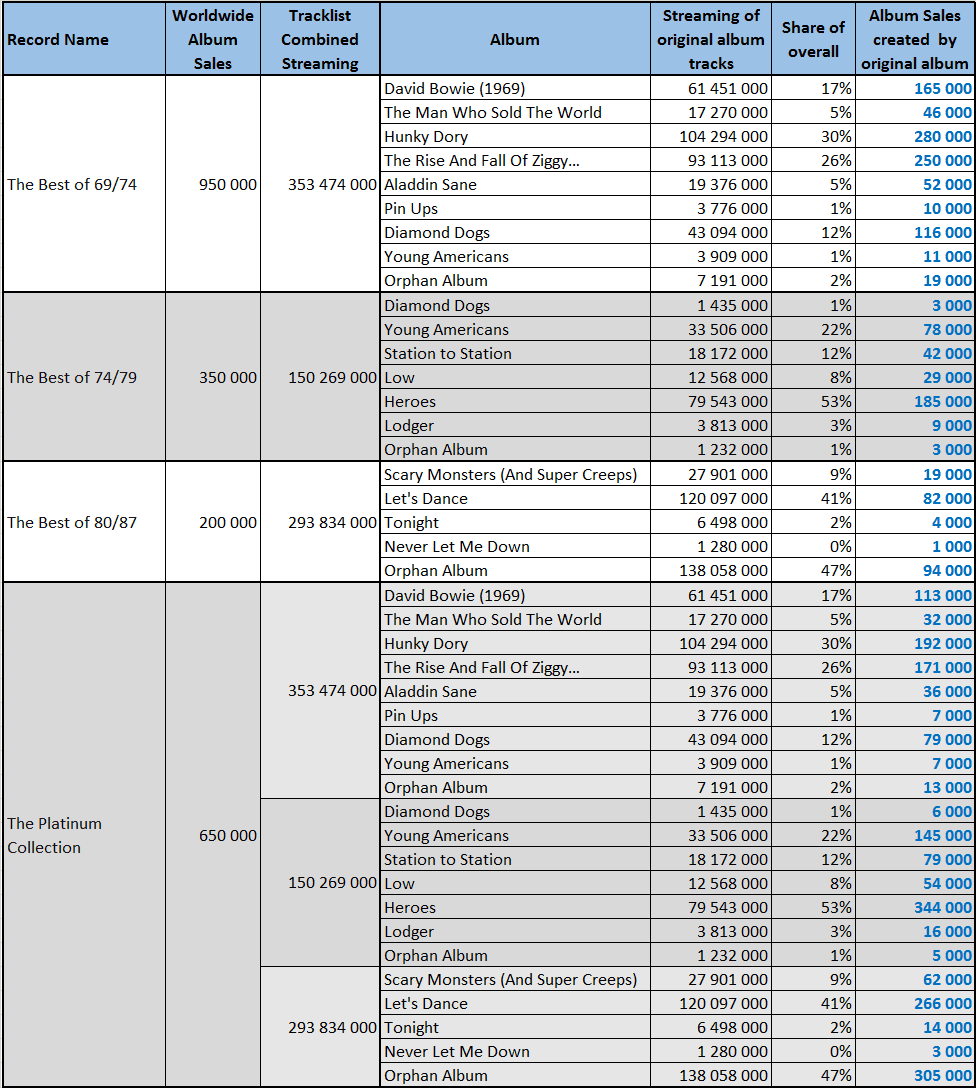
Remaining Long Format Part 5 – Career Spanning Sets
Both Best Of Bowie and Nothing Has Changed contain pretty similar track lists, with the latter including more recent hits as it got released in 2014, 12 years after the former.
As far as big hits are concerned, they feature the same ones. Considering Best Of Bowie is the best selling compilation of the artist discography, thus the 10-15% share generated from each of his classic albums represent as much as half a million units a piece.
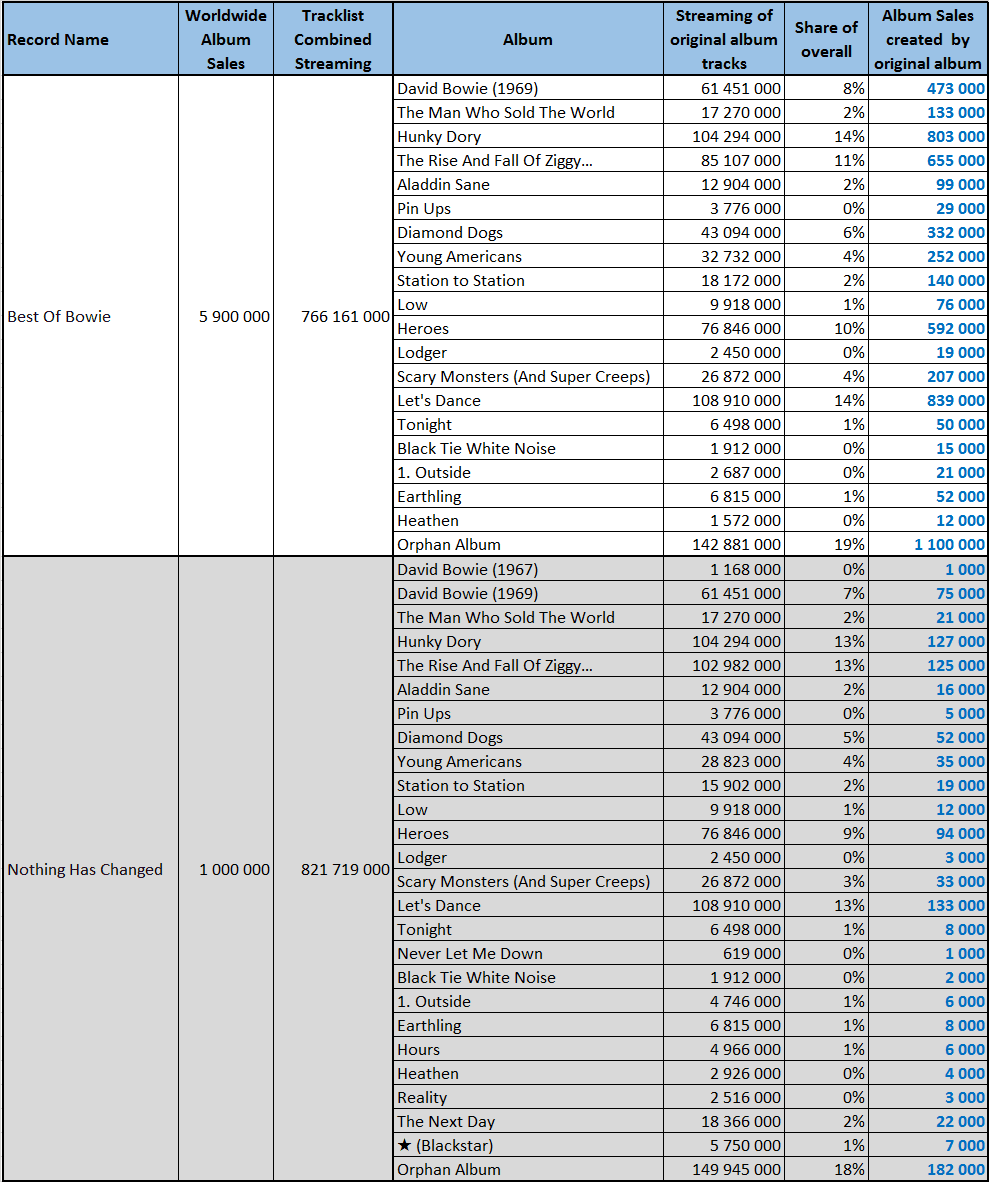
Remaining Long Format Part 6 – 10-Discs Boxes
Five Years and Who Can I Be Now are two 10-discs box sets which contain studio albums in full of the period they cover plus some rarities and live discs. Each disc is represented individually in this table with the respective 80,000 and 30,000 units sold being rewarded to all of them.
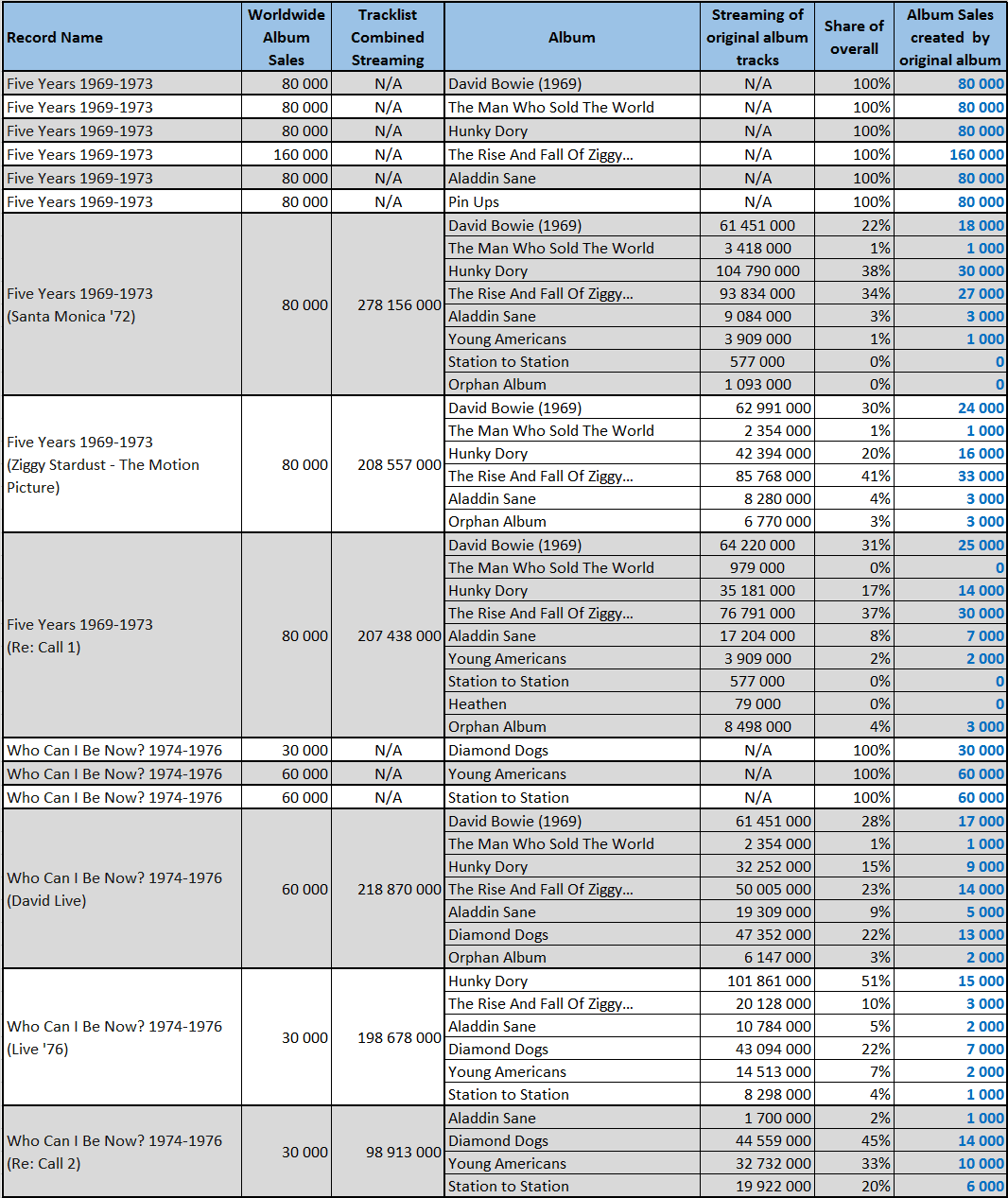
Remaining Long Format Part 7 – The Last One
Legacy is the most recent of a long list of career spanning sets, being released for 2016 fall. It contains singles ranging from 1969 Space Oddity to 2016 Lazarus.
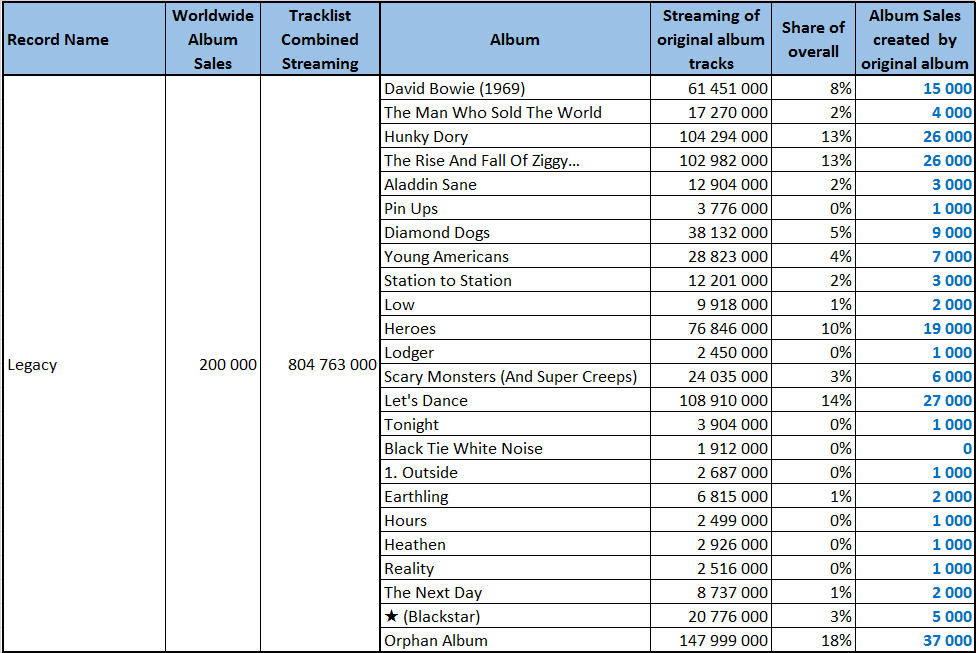
Remaining Long Format Part 8 – Early Music Videos
Early music videos of David Bowie have an even more bizarre list of songs than his early live albums. As an example, both Serious Moonlight and Glass Spider completely leave out songs from Ziggy Stardust.
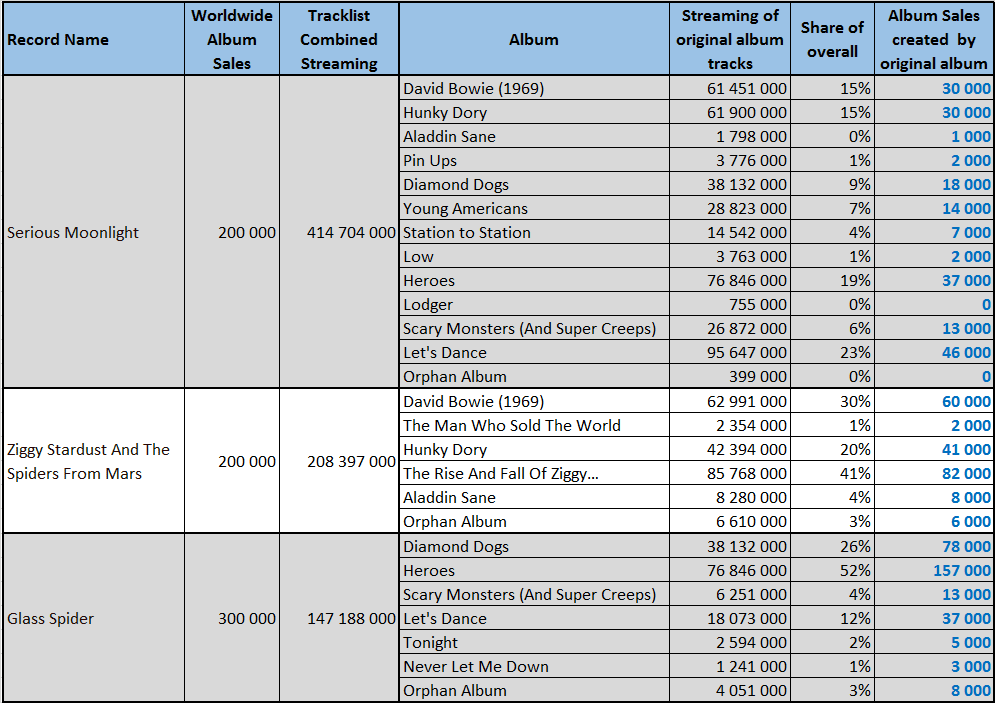
Remaining Long Format Part 9 – Later Music Videos & More
Both Best Of Bowie and A Reality Tour are the best selling music videos of David Bowie. They both follow a mostly standard distribution pattern.
The last few lines refer to the various minor soundtracks recorded by the artist plus a generic folder for all minor local compilations unlisted so far.
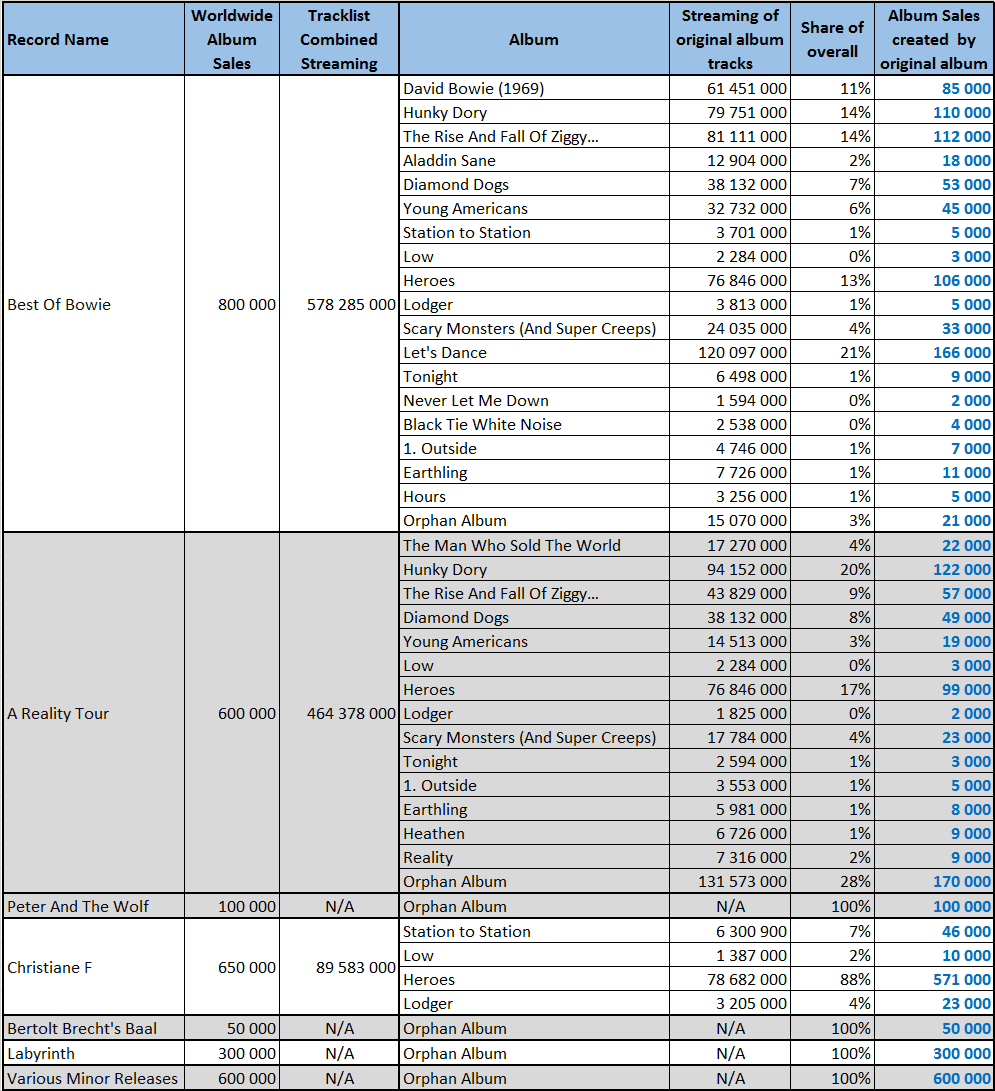
David Bowie Career CSPC Results
So, after checking all figures, how many overall equivalent album sales each David Bowie album achieved? Well, at this point we barely need to do the addition of all figures defined all over this article!
In the following results table, all categories display figures in equivalent album sales. If different, pure sales are listed between parentheses.
As a reminder:
- Studio Album: sales of the original album
- Other Releases: sales of compilations generated thanks to the album
- Physical Singles: sales of physical singles from the album (ratio 3/10)
- Download Singles: sales of digital singles from the album (ratio 1,5/10)
- Streaming: equivalent album sales of all the album tracks (ratio 1/1500 for Audio stream and 1/6750 for Video stream)
Artist career totals
See where the artist ranks among remaining singers
Thanks to all compilation and live albums sold on the back of its songs, The Rise And Fall of Ziggy Stardust and the Spiders from Mars ends up beating Let’s Dance by a few units, both at roughly 15 million equivalent album sales.
Just under Aladdin Sales in album sales only, Hunky Dory appears to be much bigger overall thanks to larger hits, it is his third album over 10 million. David Bowie (1969), Heroes, Diamond Dogs, Aladdin Sane, Scary Monsters and Young Americans all passed the 5 million mark.
Maybe even more important to highlight is the way the singer managed to stick over 1 million with all his releases except one during his last 30 years in spite of getting no hits at all in this time frame.
Guess what? A couple of albums at 15 million or 50 years of albums over 1 million is still less significant than the impressive total of 125,8 million equivalent album sales David Bowie amassed over his legendary career. Following pages list the most successful songs of the artist.
As usual, feel free to comment and / or ask a question!
Sources: IFPI, Spotify, Chartmasters.org.
Biggest tracks – David Bowie
The list of most successful songs is compiled in album equivalent sales generated by each of them. It includes the song own physical singles sales with a 0,3 weighting, its download and streaming sales with appropriate weighting too plus its share among sales of all albums on which it is featured.
1 1983 – Let’s Dance [Let’s Dance] – 8,290,000
2 1977 – Heroes [Heroes] – 7,670,000
3 1969 – Space Oddity [David Bowie (1969)] – 7,270,000
4 1974 – Rebel Rebel [Diamond Dogs] – 5,310,000
5 1971 – Life On Mars? [Hunky Dory] – 4,870,000
6 1972 – Starman [The Rise And Fall Of Ziggy Stardust And The Spiders From Mars] – 4,720,000
7 1972 – Ziggy Stardust [The Rise And Fall Of Ziggy Stardust And The Spiders From Mars] – 3,740,000
8 1980 – Ashes To Ashes [Scary Monsters (And Super Creeps)] – 3,620,000
9 1971 – Changes [Hunky Dory] – 3,600,000
10 1981 – Under Pressure [Orphan] – 3,440,000
11 1983 – Modern Love [Let’s Dance] – 2,970,000
12 1975 – Golden Years [Station to Station] – 2,640,000
13 1975 – Fame [Young Americans] – 2,610,000
14 1983 – China Girl [Let’s Dance] – 2,550,000
15 1971 – Moonage Daydream [The Rise And Fall Of Ziggy Stardust And The Spiders From Mars] – 2,390,000
16 1972 – The Jean Genie [Aladdin Sane] – 2,370,000
17 1975 – Young Americans [Young Americans] – 2,110,000
18 1984 – Blue Jean [Tonight] – 1,970,000
19 1977 – Sound And Vision [Low] – 1,870,000
20 1970 – The Man Who Sold The World [The Man Who Sold The World] – 1,730,000
21 1973 – Sorrow [Pin Ups] – 1,680,000
22 1972 – Suffragette City [The Rise And Fall Of Ziggy Stardust And The Spiders From Mars] – 1,420,000
23 1980 – Fashion [Scary Monsters (And Super Creeps)] – 1,320,000
24 1984 – Loving The Alien [Tonight] – 1,140,000
25 1982 – Cat People (Putting Out Fire) [Let’s Dance] – 1,000,000
We have more for you…
… David Bowie‘s streaming masters analysis
… checking out the upcoming artists or even voting for them!
… similar artists
… best-selling artists, albums, and singles
Artists
360° analytics – Best-Selling Artists | by Decade
Tools: Artist Dashboard | Artists Comparator
Streaming deep dive – Most-Streamed Artists
Tools: Playcounts | Royalties | Global Reach | Stats History
Other KPIs – Monthly listeners | Followers | Top money makers
This article is being discussed in our forum, join us to share your comments! »



























